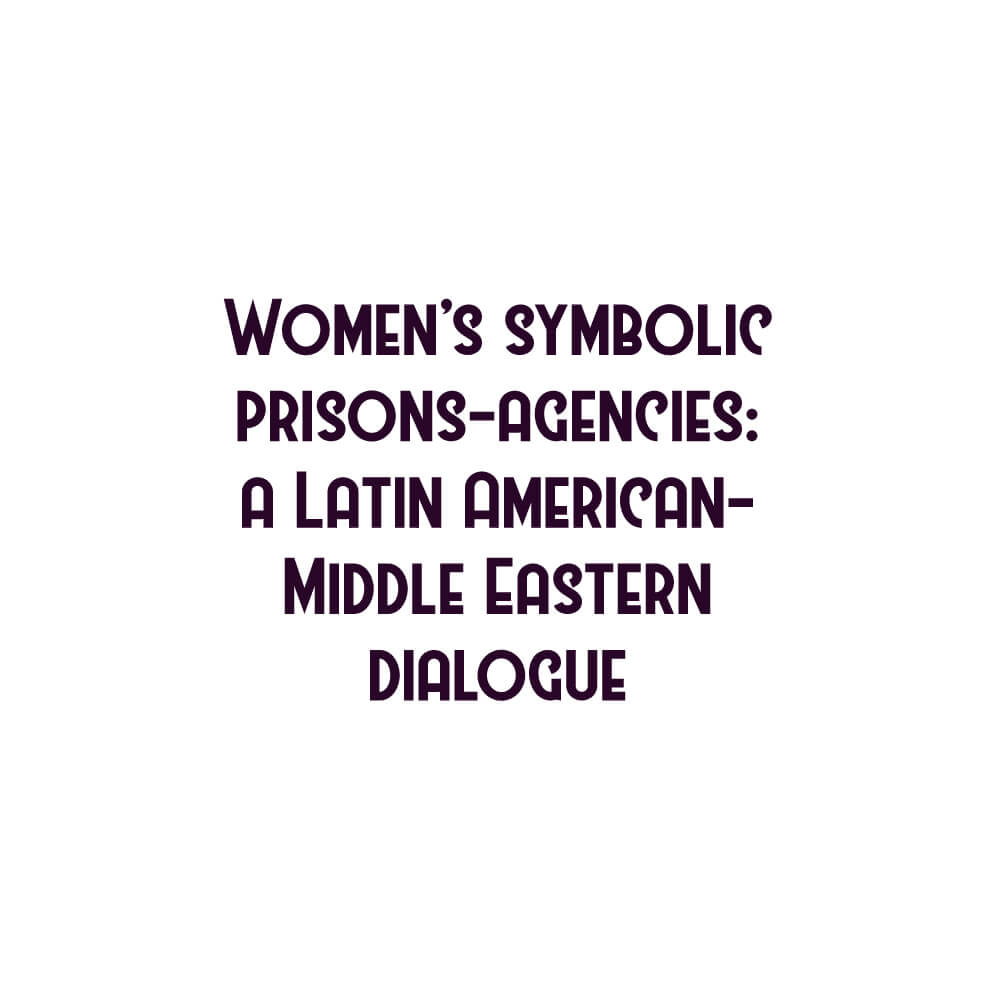Programmes

Women’s symbolic prisons-agencies: a Latin American-Middle Eastern dialogue
Abstract
In the project, we use the concept of “prison” as a visual metaphor to discuss women’s symbolic colonial-modern-patriarchal-capitalist punitiveness and oppression in everyday life, in a context that produces historical and contemporary injustices. Mainstream prison theories refer to these institutions as “total institutions” that produce hierarchical, authoritarian relationships with the aim of punishing, controlling and disciplining subjects’ docile bodies and subjectivities to reform them into productive citizens in line with hegemonic gender roles (Goffman, 1961; Foucault, 1975; Sykes, 1958). Researchers from the Global South (Bracco, 2022; Sozzo, 2022) have started to question this rigid representation of the prison and have suggested that prisons in the Global South operate in an “other” way. They have recognised that prisons operate through co-governance whereby prisoners engage in complex negotiatory dynamics with authorities; this creates “cracks” and “tunnels” within the institution, which enables prisoners to create a collective organisation and enact semi-autonomous actions in pursuit of their liberation while imprisoned.
In line with the conceptualisation of the prison configured within the Global South, we seek to expand the idea of prison from a nation-state institution that materially imprisons those who have broken legal mandates to understand it as spaces that punish, control and discipline subjects. These symbolic prisons may be our bodies, schools, and partners, to name a few examples, and have intersectional implications given dimensions such as race, ethnicity or territory. However, as noted, our interest also lies in the “cracks” and “tunnels” that enable fluid, subtle agentic moves and propel possibilities of survival through actions of resistance and solidarity (Ortega, 2015).
In this project, we will work with women from Peru and Turkey. In Peru, we will work with an organisation of former female prisoners who seek to collectively resist systematic stigma. In Turkey, we will work with politically active women supporting “women’s empowerment”. Methodologically, we will facilitate the creation of personal and collective collages in each context, mixing archive and contemporary images and objects. Through emotionally safe collective encounters, we seek to promote creativity, playfulness and dialogue. The project will use a visual storytelling platform to virtually display collages, quotes and texts created in these collective spaces. In so doing, we seek to create dialogue and connectedness between both Souths.

PhD. Lucia Bracco – Pontificia Universidad Católica del Perú, Perú
Lucia currently holds a tenure-track position in the Department of Sociology at PUCP. She has an undergraduate degree in Clinical Psychology, a Master's Degree in Gender Studies from PUCP, and a Ph.D. in Women and Gender Studies from the University of Warwick. Lucia is a founding member of the Research Group in Forensic and Penitentiary Psychology. Over the past 15 years, Dr. Bracco has actively worked within Peruvian prisons, focusing on the intricate interplay between macro and micro dimensions in the criminalization and imprisonment of women. Beyond articles written in peer-reviewed journals, in 2022, she published the book "Prison in Peru: Ethnographic, Feminist, and Decolonial Perspectives" with Palgrave Macmillan.

PhD. Demet Gulcicek - University of Warwick, UK
Demet is an Honorary Researcher at the University of Warwick and works as an Assist. Prof. in Munzur University. She holds her PhD from University of Warwick, and master’s and bachelor’s degrees from Middle East Technical University, all in sociology departments. She is currently a co-chair of AtGender (The European Association for Gender Research, Education and Documentation) and co-editor of Feminist Tahayyül Journal.

PhD. Betül Buldak - Turquía
Betül works as a Research Assistant in Munzur University, Turkey. She holds her PhD from Department of Painting, Hacettepe University. She completed her master's degree in the Painting Department of Gazi University, and her bachelor at the same university. She participated sculpture and interdisciplinary project trainings at the Complutense University of Madrid. In addition to conceptualising the impact of social power on perceptual processes, she has been recently researching on meanings of space through space perception and space environment interaction. Her research focuses on photographs, drawings and three dimensional materials aiming to reflect on spatial surface works.

M.S. Camila Rodrigo - Perú
Camila studied photography at “Centro de la Imagen” in Lima. On 2010 studied a Masters degree at Forma-Naba at Milan, in Photography and Visual Arts. On 2014 she started the Masters degree: “Mal de foco” in Latin American Photography, at “Centro de la Imagen”. She has held individual and group exhibitions in: Árles, Amsterdam, Buenos Aires, Barcelona, Chile, London, Lausanne, Lima, Mexico City, Milan, Miami, New York, Pingyao, Saint Petersburg, Ticino among other cities in the world. She has been the winner of awards and residencies in Switzerland, Mexico and Lima. She has been a photography professor for more than ten years, and works right now in Lima as an artist, freelance photographer and editor.

B.S. Luisa Pariachi- Pontificia Universidad Católica del Perú, Perú
Luisa is a Bachelor in Psychology from the Pontifical Catholic University of Peru (PUCP). She has studies in Existential Humanistic Psychotherapy. She is an assistant in the Research Group in Forensic and Penitentiary Psychology at the PUCP. Currently, Luisa works on projects with women in prison and adolescents deprived of liberty. She is starting out as a researcher with topics related to gender, gender violence, feminism, crime, human mobility, among others. Likewise, her work is centered on gender equality, intersectionality, human rights, and a community approach.